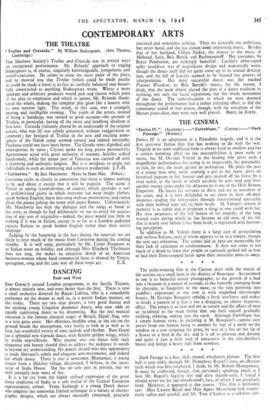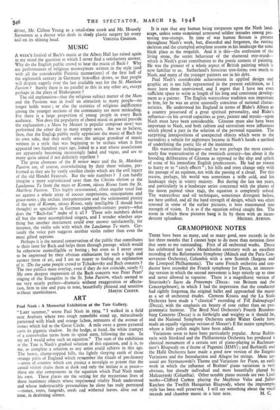THE CINEMA
" Enrico IV." (Academy.)—" Farrebique." (Curzon.)—" Dark Passage." (Warner.) Enrico IV is an adaptation of a Pirandello tragedy, and it is the first post-war Italian film that has nothing to do with the war. Tragedy in its stark undiluted form is always hard to swallow and has a certain numbing effect on the susceptibilities it most seeks to excite, but M. Osvaldo Valenti in the leading role gives such a magnificent performance, his acting is so impeccable, his personality so rich, he stirs the heart against its inclination. He plays the part of a young man who, while courting a girl in the 192os. gives an historical pageant in her honour and gets pushed off his horse by a rival suitor, as the result of which accident he goes mad and lives another twenty years under the delusion he is one of the Holy Roman Emperors. He forces his servants to dress and act as members of his court, and it is very delightful to see them in their off-duty moments reading the newspapers through hornzrimmed spectacles with their bobbed wigs still on their heads. M. Valenti's return of memory is as subtle and as poignant a thing as one could wish for. His slow awareness of the full horror of his tragedy, of the long wasted years during which he has become an old man, of his life that is nearly over before it has been lived, is registered with harrow- ing perception. • In addition to M. Valenti there is a large cast of gesticulating and verbose Italians, each of whom appears to be in a temper, though the text says otherwise. The scenes laid in 1920 are memorable for their lack of caricature or condescension. It does not come as too much of a shock to learn that people so curiously garbed fell in love or laid their Eton-cropped heads upon their muscular arms to weep.
* * * * The prize-winning film at the Curzon deals with the march of the seasons on a small farm in the district of Rouergue. Accustomed as one is to beautiful nature photography, to the growth of a bud into a blossom in a matter of seconds, to the butterfly emerging from its chrysalis, to footprints in the snow, to the rain pattering into puddles • conversant as one now is with magnified microscopic beauty, ivt. Georges Rouquier unfolds a fresh loveliness and makes so heady a pattern of it that it has a drugging, an almost hypnotic, effect. The tempo is so slow and yet so certain and the affairs of men so incidental to the main theme that one feels oneself gradually yielding, relaxing, sinking into the earth. Although Farrebique has a simple human story, in picturing it M. Rouquier's camera ever passes from one human being to another by way of a moth on the window or a cow cropping the grass, by way of a bee on the lip of a flower or a bird in the sky, and it is all so pleasant and dreamy and quiet it lays a little seed of uneasiness in the city-dweller's breast and brings a heavy sigh from nowhere.
* * * * Dark Pasiage is a fine, slick, amoral whodunnit picture. The first half is seen solely through Mr. Humphrey Bogart's eyes, an effective trick which was first employed, I think, by Mr. Robert iviontgomery. It must be confessed, though, that, personally speaking, much as I love Mr. Bogart's fugitive feet and dirty thumb-nails, I feared I should never see his sad bloodhound's face, of which I am peculiarly fond. However, it appeared in due course. This film is brilliantly cast. Miss Lauren Bacall and Miss Agnes Moorehead look respec- tively sullen and spiteful, and Mr. Tom d'Andrea as a talkative cab- driver, Mr. Clifton Young as a small-time crook and Mr. Housely Stevenson as a doctor who deals in shady plastic surgery hit every































 Previous page
Previous page